Essaouira is a small seaport three hours east of Marrakesh. It is distinguished by its medina or old town, itself surrounded by thick medieval walls topped by brass cannons that face the roiling Atlantic. It is a city of walls and gates. You may even have seen it; movies about great battles are shot in this quiet town: Star Wars, Game of Thrones, parts of Laurence of Arabia, there’s even an overgrown garden just outside the medina named for Orson Welles, who shot his portentous Othello on these walls in the late 1940s. The production was facing money problems and he couldn’t get the movie’s costumes out of Italy to Essaouira. He says he gathered all the tailors in town, showed them the drawings of the costumes and got them to work. The armor on the soldiers, he says, were flattened sardine cans from the local dump. I watched as much of the movie as I could stand and, sure enough, there were the walls we had just walked, thick with soldiers probably all smelling like sardines.
The smell and look of the fish market will make a vegetarian out of you. The cats don’t mind a bit but we skedaddled after one visit. We went there intending to do what you do in Essaouira: buy a fresh fish and then take it over to a local guy who will filet it and put it on the grill for you. The devil, as they say, is in the details. First of all, we don’t know one fish from another, and there are a lot of fish to choose from. Even if they told us this one’s a flounder and that’s a haddock, we still wouldn’t have a clue how to decide. We were warned ahead of time how to select a fresher fish by looking at the eyes or something like that; yeah, right. Finally, there’s the marketplace itself, slippery with fish guts, thick with flies and cats. And those grills with rusty chairs and tables in front? Located conveniently right next door to you-know-what.
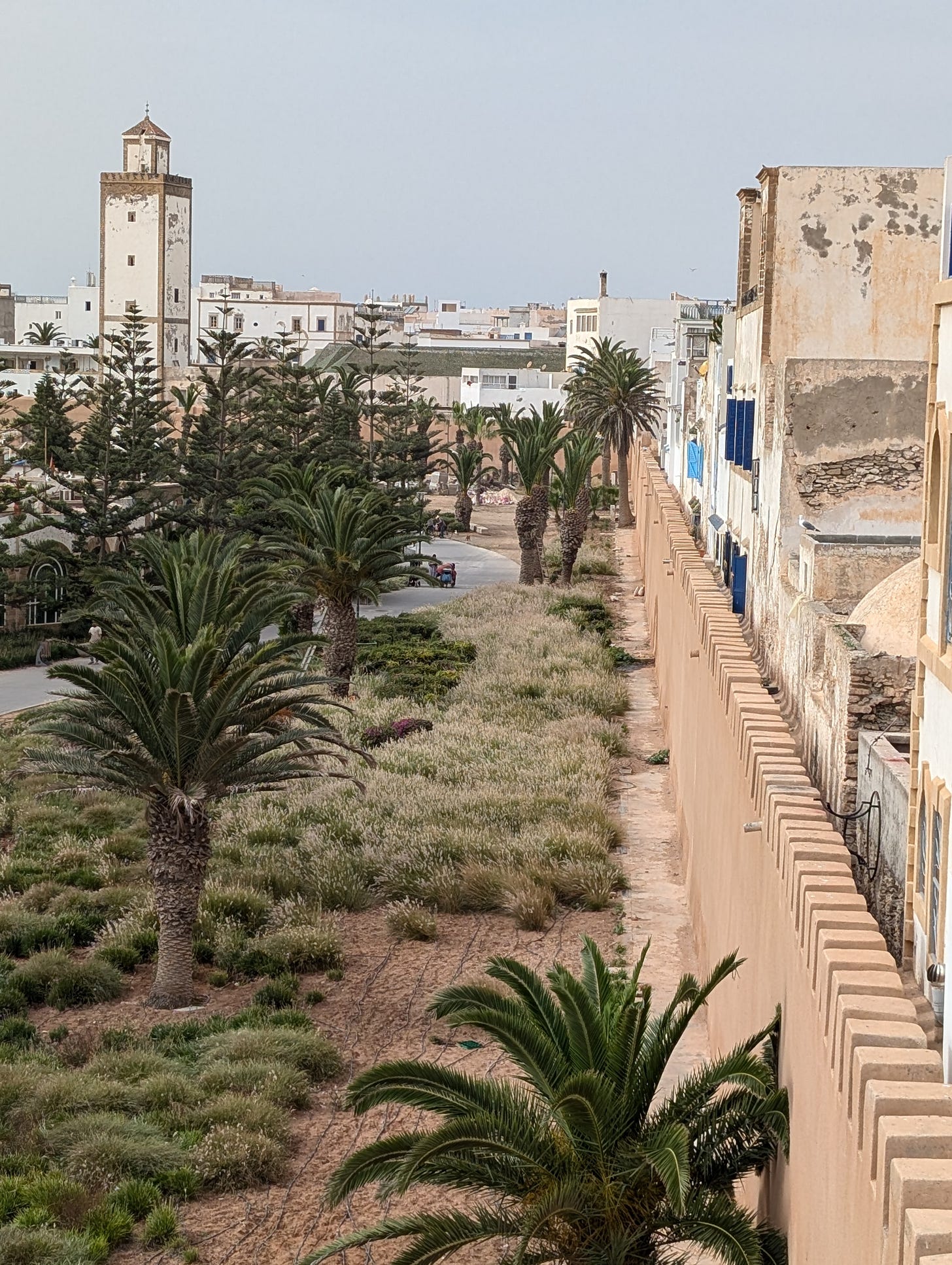
It’s getting on to the winter solstice so it’s dark at six a.m. when the muezzin begin their first call to prayer. That wakes the seagulls and dogs, and the next thing you know your day has begun. We open our shutters onto the ocean (our Riad is called “The Western Wall” becaus it abuts the west medina wall) and hear the roar of the waves. Breakfast is at nine on the fourth floor balcony overlooking the bay, baguette with all the fixin’s, espresso, injera (African spongy bread), olives, and some other tasty things. Madame, the 80 year-old Moroccan woman hired by the house, makes her way upstairs with the trays. We’re the only ones in the place because it’s low season, but also because the Riad just opened. Some days we’re joined by our new friend, the house raconteur. He is our unofficial guide to the city.
Our French ex-pat hosts, David and Marc, are letting their fellow ex-pat, Our Guide, stay for free at the Riad until he can pay, which may be never. He’s a DJ at a local restaurant, working a few hours a night, mainly when he feels like coming in. To make matters more complicated his young Moroccan boyfriend has taken up residence at the place as well. It’s a modern TV sitcom.
Essaouira is a city of walls and gates, and doors. Our Guide is our key to the doors that open sesame when he’s around. He either leads us, struggling to keep up with his brisk pace through the maze of the medina, or he sends us out on our own to get lost and then find our way. What do we see? Old, funky and chic. A store that only sells mid-century modern Moroccan home decor, three floors of photos and posters from the ‘50s, including a framed photo of the King of Morocco with President Eisenhower, alongside Scandinavian design furniture and cool Moroccan art and artifacts. A woman-owned coffeehouse overlooking the old Jewish and Christian cemetery, and the ocean beyond. An ancient synogogue. An elegant rooftop restaurant with a bar that serves real alcohol. He takes us out to lunch and lets us pick up the bill. He invites his boyfriend along, who at 21, buries himself in his phone as Our Guide spins yarns about his youth in Paris, Japan and South America, helping himself to another white wine. “I never went to college,” he tells us in his thick French accent, cigarette in one hand and wine glass in the other, “because I figured I was going to die from AIDS and so, you know, what the hell. But I never got AIDS! Now, it’s too late for all that. Instead, I know three languages and am a man of the world!”
“By 2015, I had had enough of Paris. Dirty, violent, not the Paris I knew.” His far-away gaze takes him back to Paris, allowing him to ignore the filth and stench directly in front of us. “Then, a man asked me to come to Essaouira to open a restaurant for him, but that fell through. So, voila, here I am!” It is the most natural thing in the world for our guide to live by his wits.
“I was 17 and living in Montevideo with my father, who was invited to a party at the Japanese Ambassador’s residence. I wanted to be a model so I got dressed up and when I walked in all eyes were on me. And it worked! Someone asked me to be a model in Japan, and of course I said yes. In Japan, I roomed with Cameron Diaz, but of course nobody knew her. Years later I saw her in Paris walking with Matt Damon. I said to myself, ‘Who’s that slut walking with Matt Damon?’ Then, she recognized me! The three of us spent the day looking for French movie posters because Matt Damon wanted to find some French Noir.” He flicks his wrist for emphasis and the ash from his Gauloises goes somewhere.
In the evening the wind comes up and in the silence of the Riad we hear shutters slamming, all of a sudden. A day with Our Guide can be a long day, so we beg off his invitation to meet at the restaurant where he DJs, turning down his promise of a wild evening.
Our Guide takes me for a haircut and shave at his favorite barber, and comments on the job in French over the man’s shoulder while he works. As so often happens in Essouira, I feel like I’m in a movie set of a barber shop. Both Penny and I have the same odd impression of this city, that it looks curated in its disorder: the old rusty barber chair and scattered tools, half-empty bottles, you feel like you know this barber shop, that you’ve seen it in a play, the product of a set designer. Maybe it’s because no barber shop, or cafe, or street in the USA would ever look like what we find here, but it’s recognizable because it would look something like this. A barber chair, check, but not a rusty, dirty, broken, badly repainted, seat sprung, leather cracked and worn away barber chair like you might find on deep sale in the back of an antique store. Only a set designer would find that barber chair and put it in a play about an old barber shop. Whatever the reason, the result is disorienting.
Penny and I walk along the curving beach and watch windsurfers and beginner surfers taking lessons. When I was young and living in LA, surfing beginners were called “Hodads.” The name evolved to include anyone who was unpleasant. We walk by strings of camels and beautiful horses, all waiting for tourists to ride. We find a cool place to eat lunch along the beach, at a chi chi restaurant suggested by Our Guide. Alot is being said these days about animal cruelty, which is one reason why we don’t participate in that kind of stuff, but I considered another kind of cruelty as my eye caught two young camel drivers sitting in the shade of one of their camels and staring idly at the restaurant and its patrons through the glass. They were teens but I thought I recognized the stare of a hungry child watching people eating. It gets tiresome to be approached by vendors, but there is a gap we privileged people don’t see, or forget about, because we don’t have to remember. I turned away, to keep my perfectly prepared fishburger and fries from sticking in my throat.
Back we go, today, to Marrakesh.




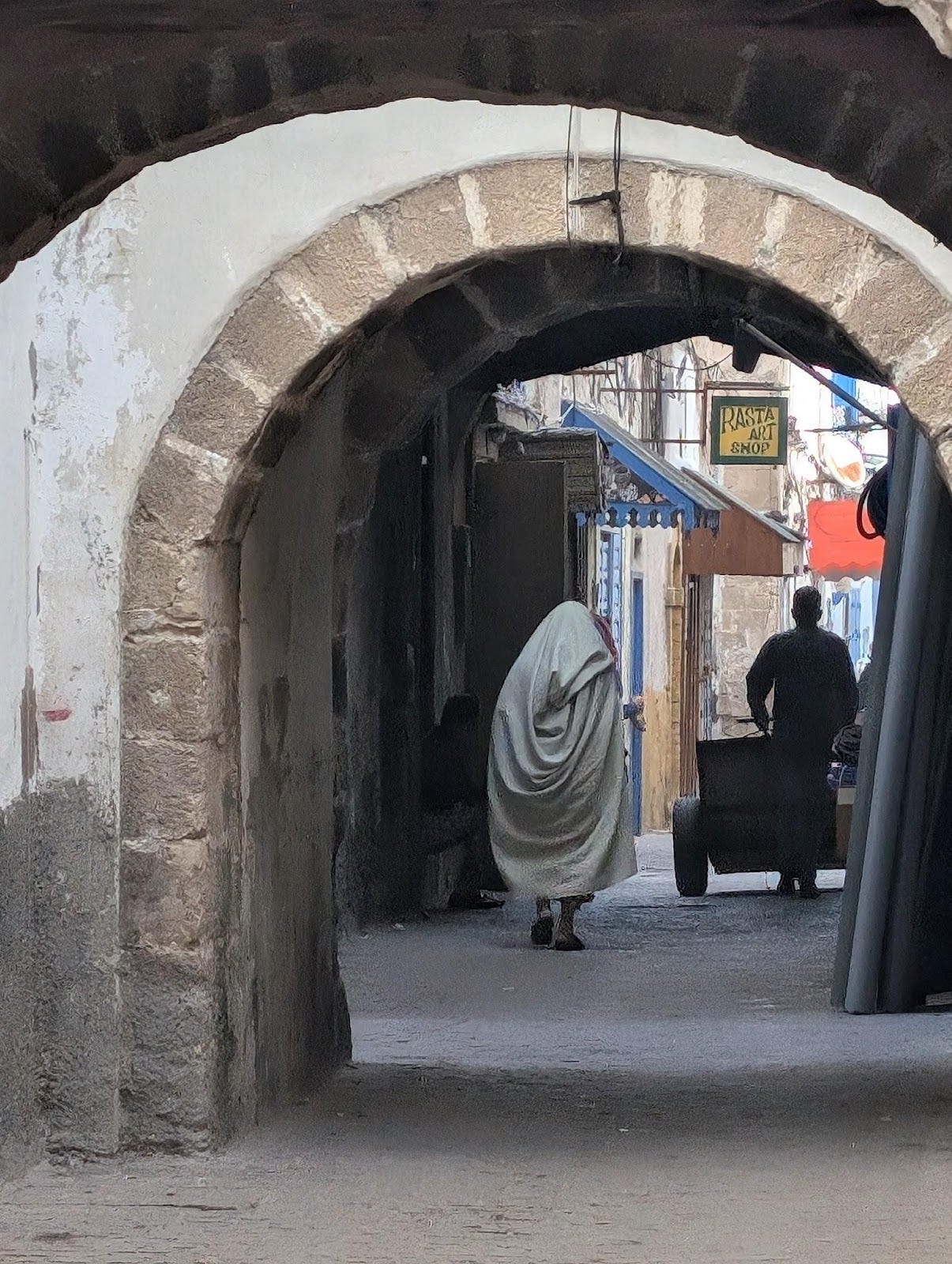
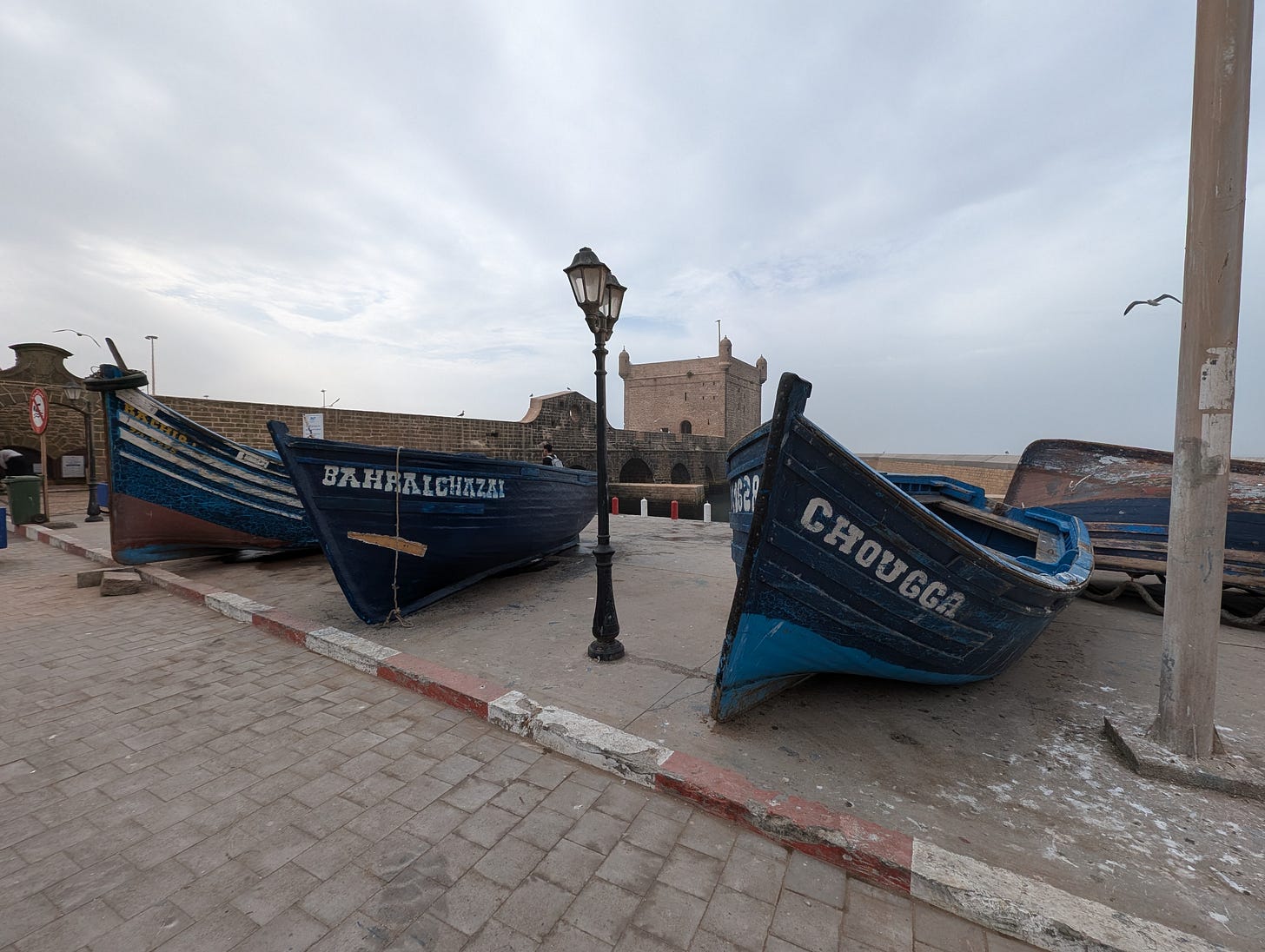
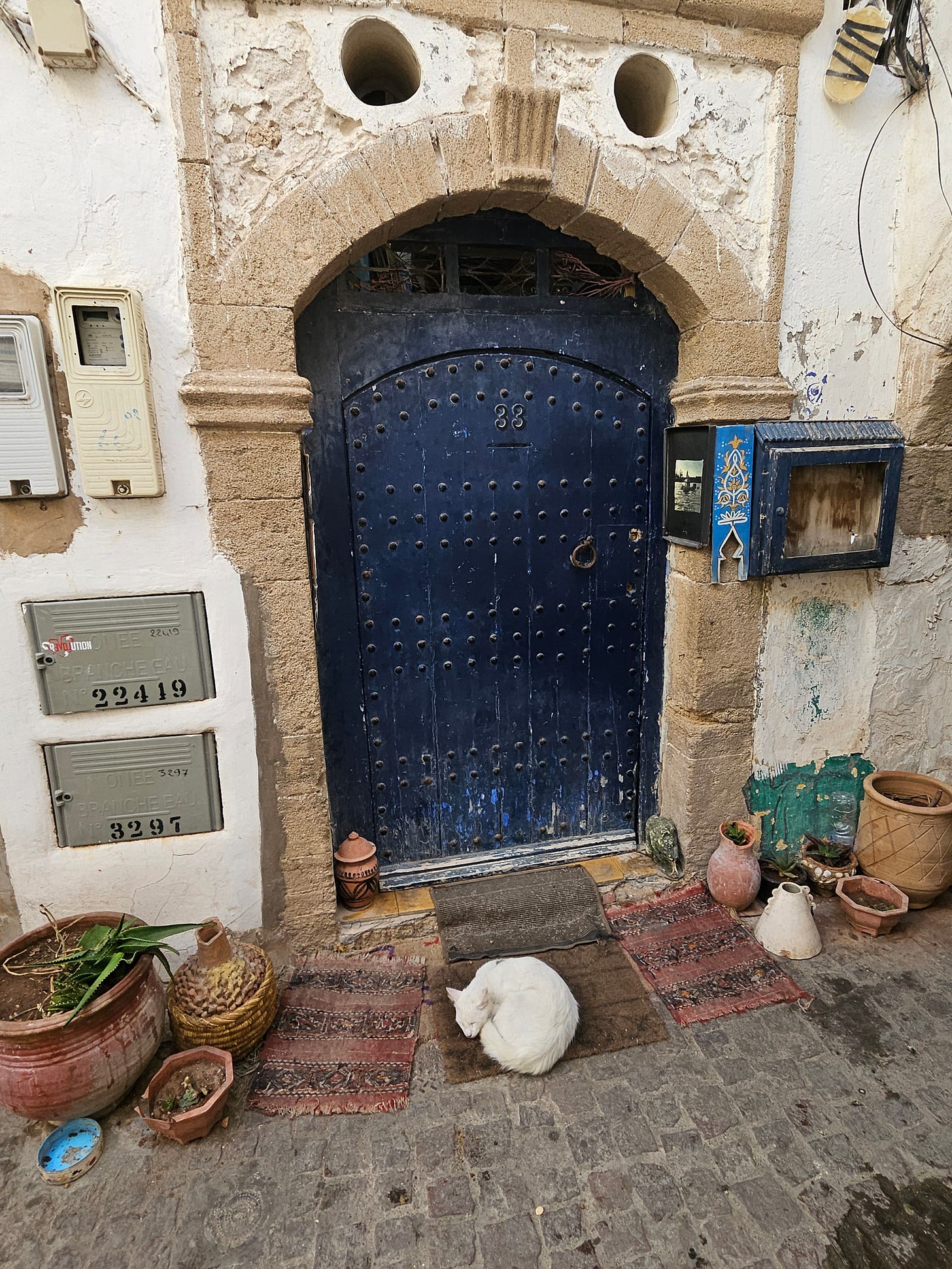
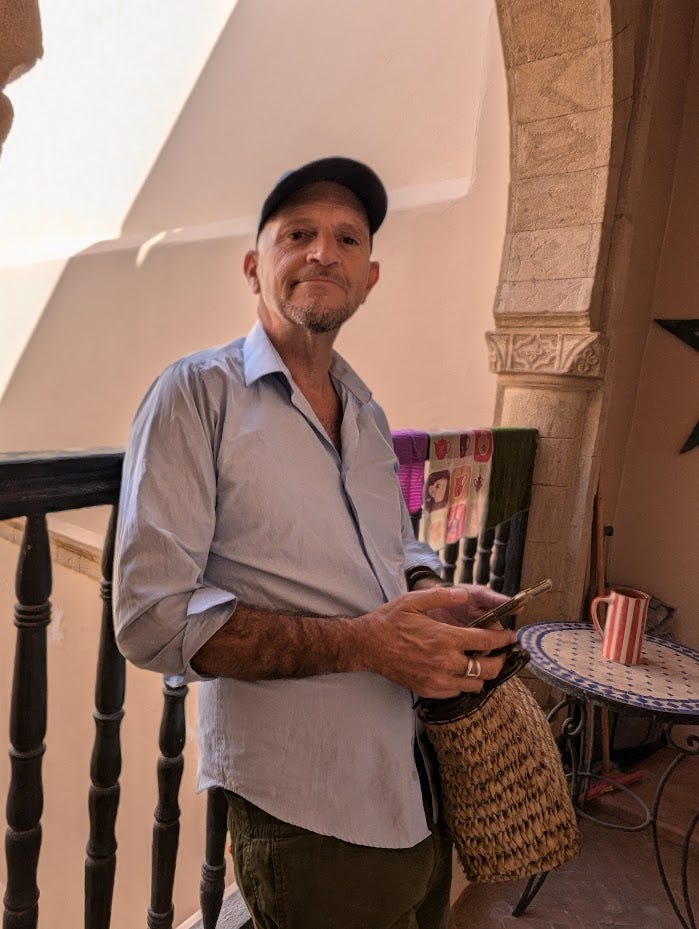
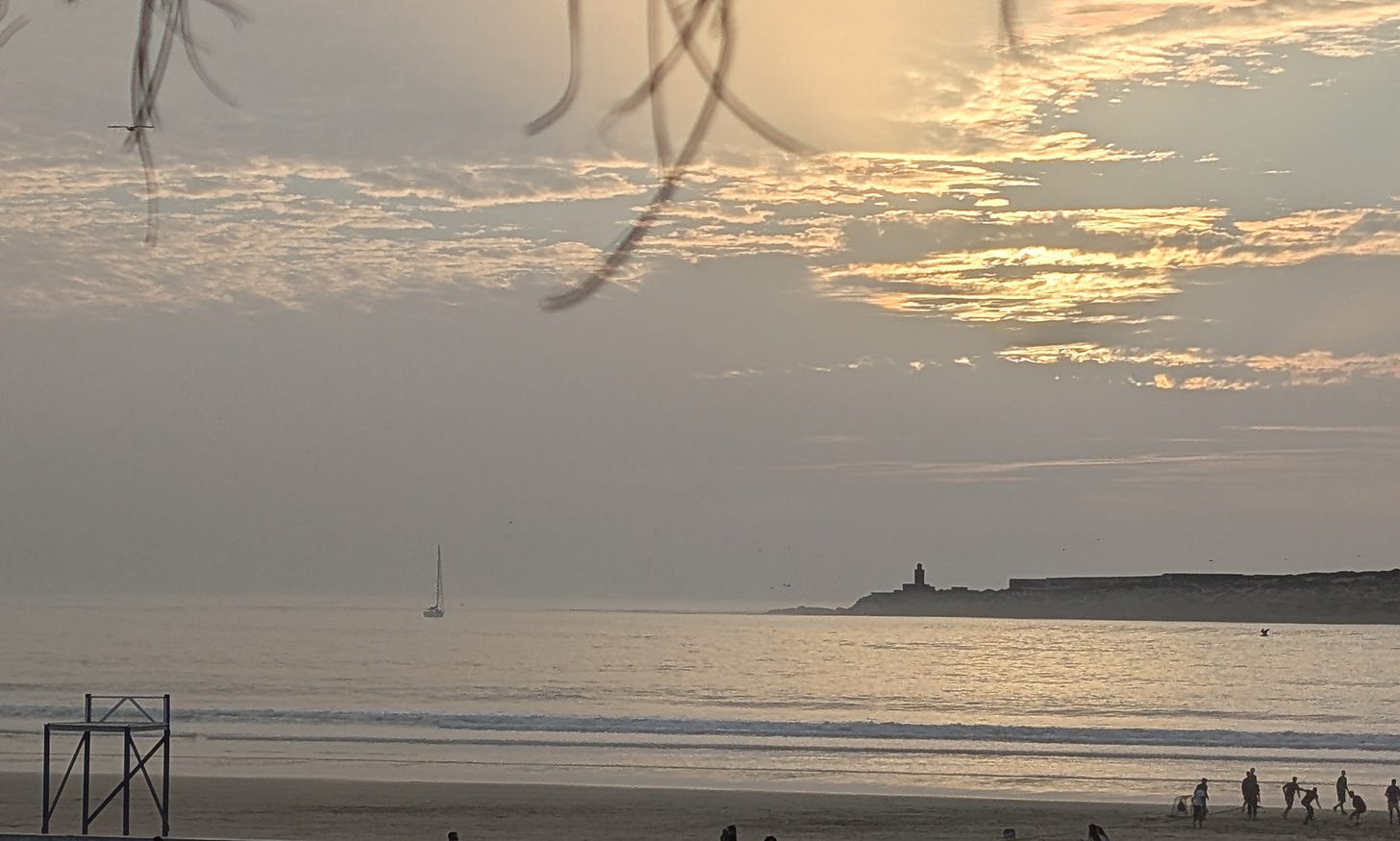
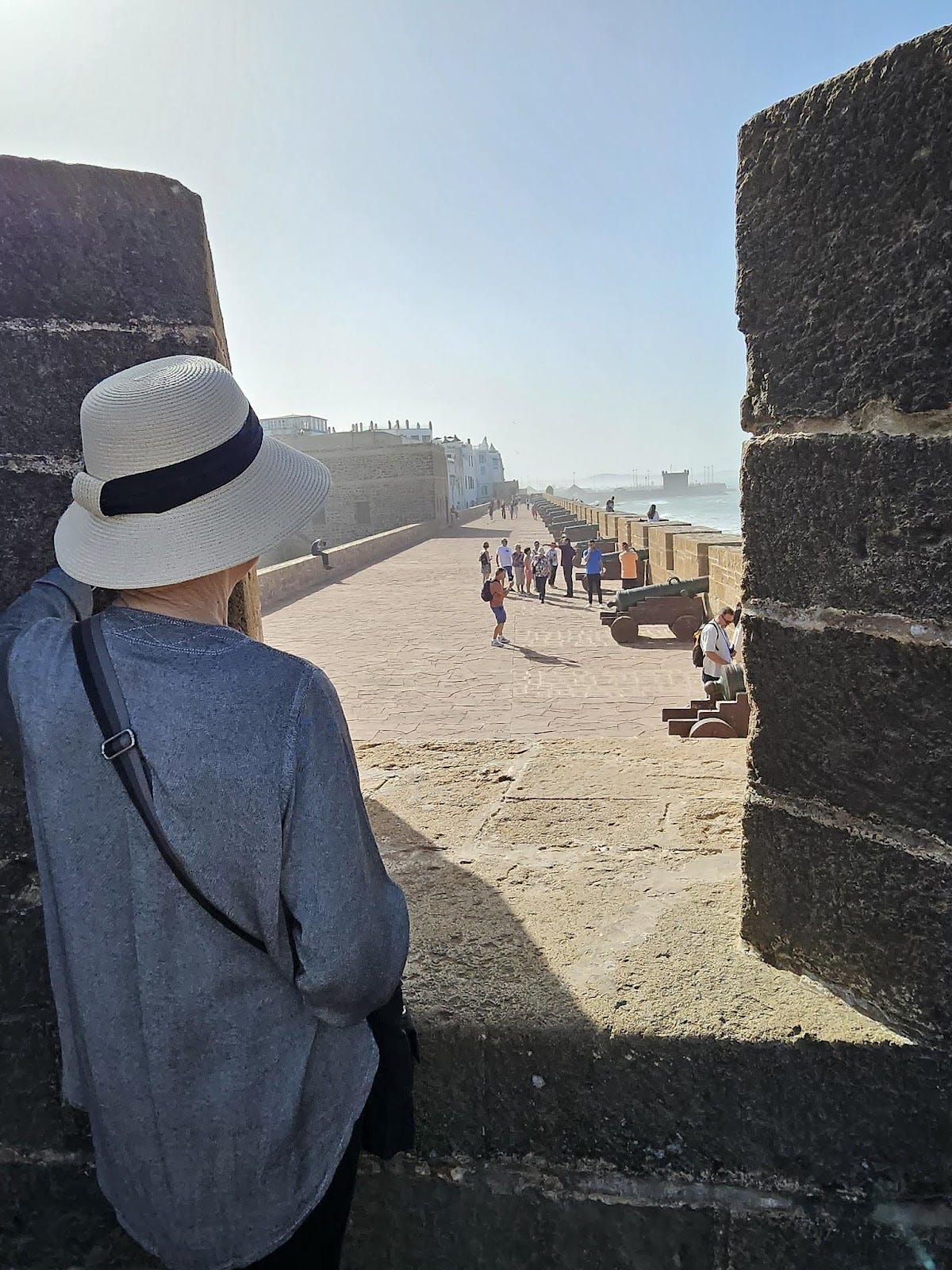
So exotic, this part of the adventure. Love the indigo doorway and your descriptions of the senses at play in your surroundings.
You can really tell a story! I love all the details.